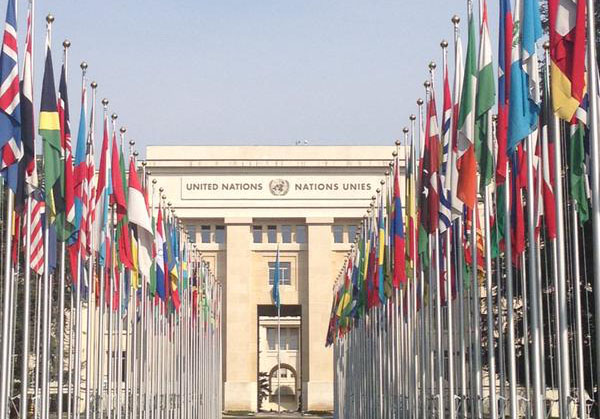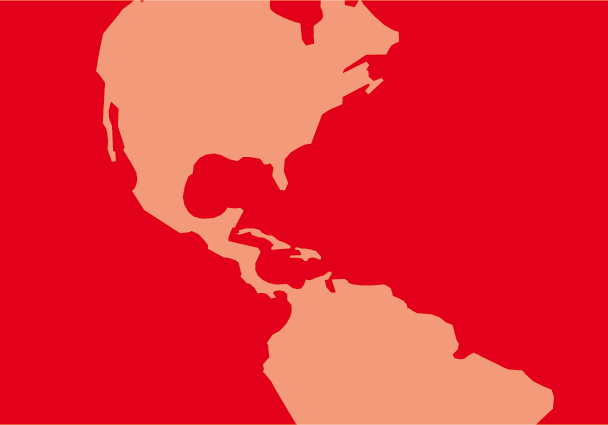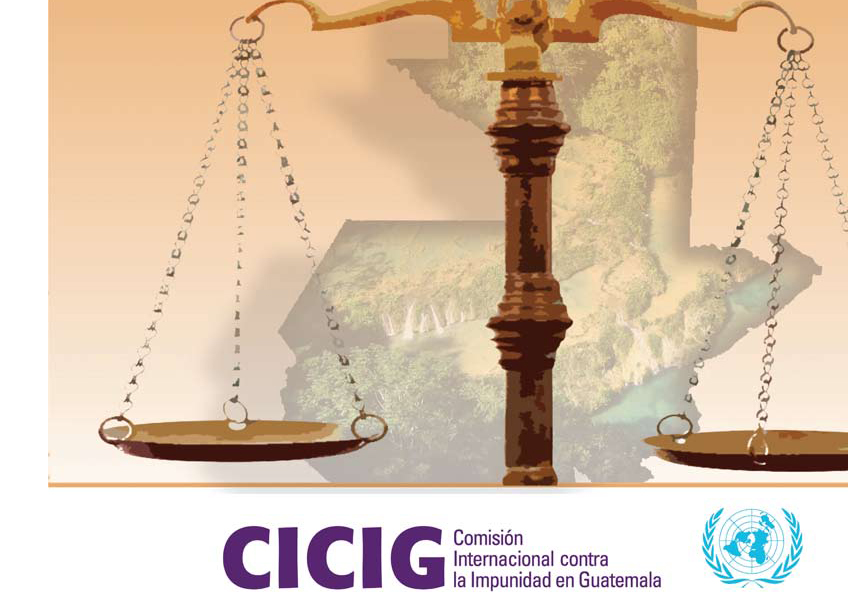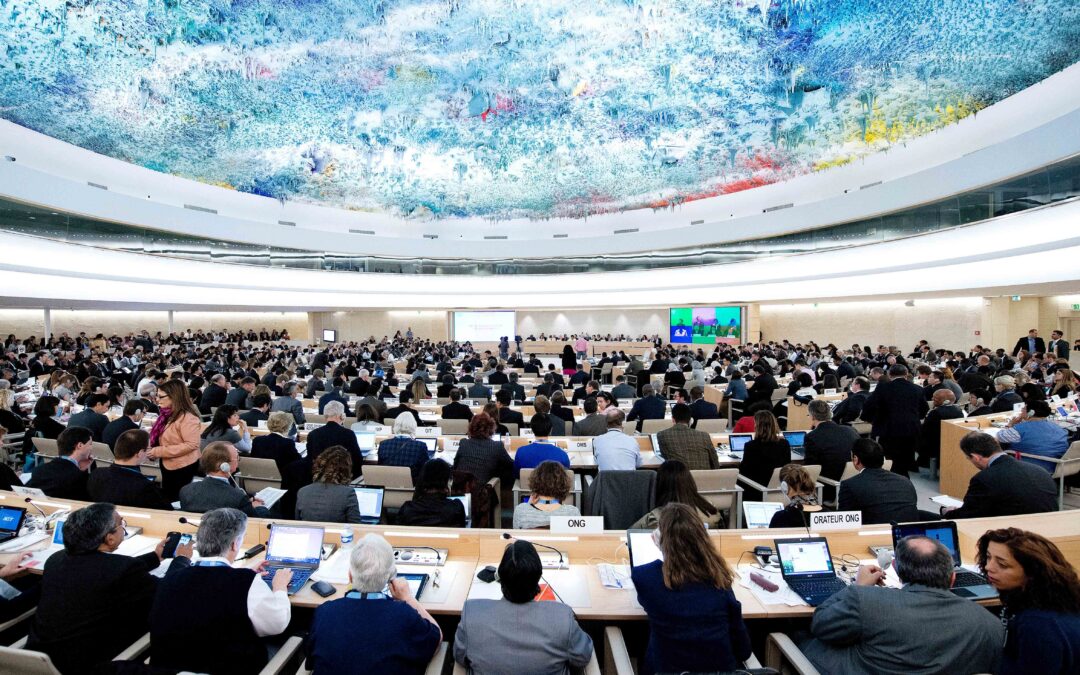
Jul 5, 2018 | Advocacy, Non-legal submissions
The ICJ today joined 91 other NGOs in calling on the UN Human Rights Council to act in response to the downward spiral for human rights in Venezuela.
The joint statement was delivered on behalf of the group by Human Rights Watch during a general debate (check against delivery).
“Spiralling downwards with no end in sight”: That’s how a group of UN Special Procedures, including the Special Rapporteurs on health, adequate housing, extreme poverty and food categorized Venezuela in January of this year. This is also the title of a report released by the OHCHR on June 22, which paints a devastating picture of arbitrary detentions and extrajudicial killings coupled with a severe shortage of food and basic medicines.
One Venezuelan mother interviewed by OHCHR said: “I have a little baby that cries and cries because I can´t feed her. The baby’s milk formula costs 3 million Bolivars and my husband only makes 1.2 million a month. (…) My neighbours told me that if I don’t vote for the Government they will take the food, the cash bonus and my house from me. They control the electoral authority, so they know for which party you vote.”
The UN Human Rights Council can no longer look away. Venezuela has spiralled into a human rights and humanitarian crisis that demands urgent action. The crackdown on dissent continues. The population has lost an average of 11 kilos in 2017. Most Venezuelans go to bed hungry, and according to the UNHCR, more than 1.5 million Venezuelans have fled the country, for reasons including political persecution, violence, and the ongoing humanitarian crisis. As a result, a 2,000 percent increase in asylum applications has been recorded across Latin America since 2014, and hundreds of thousands remain in an irregular situation, which increases their vulnerability.
Today’s joint statement delivered by Peru on behalf of 53 States adds to the chorus of international concern. The Human Rights Council also needs to step up and address the human rights violations suffered by the Venezuelan people at the hands of a member of this Council. We encourage continued reporting by the High Commissioner, and hope that today’s joint statement paves the way for the international investigation that the High Commissioner has called for and which is so desperately needed.
Acceso a la Justicia
Acción Solidaria
ACCSI Acción Ciudadana Contra el SIDA
Action for Solidarity
African Centre for Democracy and Human Rights Studies
ALAPLAF
Ana Belloso
ASOADNA
Asociación Civil Fuerza, Unión, Justicia, Solidaridad y Paz (FUNPAZ)
Aula Abierta
Canada Venezuela Democracy Forum
Cátedra de Derechos Humanos de la Universidad Centrooccidental Lisandro Alvarado
Center for Justice and International Law
Centro de Acción y Defensa por los Derechos Humanos – Cadef
centro de Derechos Humanos de la Universidad Metropolitana (CDH-UNIMET)
Centro de Derechos Humanos, Universidad Católica Andrés Bello
Centro de Documentación en Derechos Humanos “Segundo Montes Mozo S.J.” (CSMM)
Centro de Formación para la Democracia (CFD Venezuela)
Centro de Justicia y Paz – CEPAZ
Centro de Promoción y Defensa de los Derechos Sexuales y Reproductivos – PROMSEX
Centro para la Paz y los DDHH de la Universidad Central de Venezuela
Centro para la Paz y los DDHH Universidad Central de Venezuela
Centro Regional de derechos Humanos y Justicia de Genero: Corporación Humanas
Cisfem
CIVICUS
Civilis Derechos Humanos
Clínica Jurídica de Migrantes y Refugiados de la Universidad Diego Portales
Codevida
Comisión de Derechos Humanos de la Facultad de Ciencias Jurídicas y Políticas de la Universidad del Zulia
Comisión de Derechos Humanos de la Federación de Colegios de Abogados de Venezuela del Estado Tachira
Comisión para los Derechos Humanos del estado Zulia, Codhez
Comisión para los Derechos Humanos y la Ciudadanía (CODEHCIU)
COMITE POR UNA RADIOTELEVISIÓN DE SERVICIO PÚBLICO
Conectas Direitos Humanos
Convite AC
Coordinadora Nacional de Derechos Humanos
Defensa y Justicia Carabobo
Defiende venezuela
Dejusticia
Epikeia, Observatorio Universitario de Derechos Humanos
Espacio Público
EXCUBITUS derechos humanos en educacion
FADNNA
Federación interamericana de Abogados capitulo Venezuela seccional Anzoategui
Foro Penal
Franciscans International
Fundacion Aguaclara
Fundación Espacio Abierto
FUNDACION ETNICA INTEGRAL
Fundación Niños, Niñas y Adolescentes
Fundación para el Debido Proceso (DPLF)
Fundamujer
Humano Derecho Radio Estacion
Human Rights Watch
Iniciativa Por Venezuela
Institute on Race, Equality and Human Rights
International Commission of Jurists
International Movement Against All Forms of Discrimination and Racism (IMADR)
International Service for Human Rights
Ipys Venezuela
Juventud Unida en Acción
Laboratorio de Paz
Madres de Soacha (Colombia)
María Estrella de la Mañana
Maria Eugenia
Misión Scalabriniana Ecuador
Monitor Social A.C. (Venezuela-Edo. Nva Esparta)
Movimiento Vinotinto
Mulier
Observatorio de Derechos Humanos de la Universidad de Los Andes
Observatorio Venezolano de Conflictividad Social (OVCS)
Observatorio Venezolano de la Salud
Organización StopVIH
PADF Honduras
Padres organizados de Venezuela
Paz y Esperanza
Pedro Luis Echeverria
PEDRO NIKKEN
Prepara Familia
Promoción Educación y Defensa en DDHH (PROMEDEHUM)
Revista SIC del Centro Gumilla
Robert F Kennedy Human Rights
Seguridad en Democracia (SEDEM)
Sin Fronteras IAP
Sinergia, Red Venezolana de Organizaciones de la Sociedad Civil
Thais Parra
Transparencia Venezuela
UCV
Una Ventana a la Libertad
Unión Afirmativa de Venezuela
Union Vecinal para la Participación Ciudadana A.C
West African Human Rights Defenders Network
World Organisation Against Torture (OMCT)

Jun 28, 2018 | News
On 24-25 June, ICJ Commissioners from the Latin America region came together in Bogotá, Colombia, to consider and enhance ICJ strategies to combat past and resurging trends in extrajudicial executions and enforced disappearances in the region.
The meeting was the first of its kind to bring together ICJ Commissioners on a regional basis: Carlos Ayala (Venezuela); Miguel Carbonell (Mexico); Gustavo Gallón (Colombia); Roberto Garretón (Chile); Juan Mendez (Argentina); Victor Rodriguez Rescia (Costa Rica); Alejandro Salinas Rivera (Chile); Mónica Pinto (Argentina); Belisário dos Santos Júnior (Brazil); and Wilder Tayler (Uruguay).
The meeting was followed by a preparatory mission (involving two Commissioners and the ICJ’s legal representative in Colombia) on the transitional justice mechanisms envisaged under the Havana Agreement, with a particular emphasis on the jurisdiction and operation of the ‘Special Jurisdiction for Peace’. A full high-level mission will follow in September, at which time the ICJ intends to identify minimum benchmarks for the effective operation and sustainable impact of those mechanisms.
In all regions of the world, recourse to enforced disappearances and extrajudicial killings continues; victims and their families (the overwhelming majority of whom are women, children and indigenous peoples from rural areas dominated by poverty and social and political exclusion, as well as trade unionists and human rights defenders) struggle to obtain prompt and effective remedies and reparation; and perpetrators enjoy impunity through inadequate or improper laws, ineffective institutional frameworks, selective recourse to accountability mechanisms and/or political interference in the functioning of those mechanisms.
The meeting confirmed that these challenges are particularly evident in Latin America, where there has been a resurgence in recourse to enforced disappearances and extrajudicial killings in countries throughout the region and where violations of the past have in very many cases been inadequately addressed. By way of example:
- In Brazil, official statistics from 2016 attest to the occurrence of 62,000 violent deaths and potentially up to 22,000 enforced disappearances each year.
- 45 years after the coup d’état in Chile, about 800 people have been convicted and sentenced to imprisonment, but those figures belie the extensive occurrence and levels of responsibility for gross violations of human rights that occurred.
- In Colombia, more than 70,000 cases of enforced disappearance were documented by the Attorney General for the period 1970-2015 and there is general consensus that the number of missing persons likely exceeds 100,000. The wide and persistent extent of extrajudicial killings has been noted by UN and Inter-American experts and bodies as well as the Office of the Prosecutor of the International Criminal Court.
- In Guatemala, only 34 convictions for conduct involving conflict-era violations have been secured, despite the fact that the internal armed conflict of 1960-1996 involved massive and systematic human rights violations. Impunity has undermined redress and accountability and severely weakened the prevention of violations, with the National Civil Police having recorded more than 25,000 people ‘disappeared’ in 2003-2014, more than half of which were women.
- Peru’s internal armed conflict of 1980-2000 resulted in more than 69,000 people killed and ‘disappeared’, but less than 100 convictions have been secured under the judicial subsystem established in 2004 that specializes in accountability for gross human rights violations.
- In Venezuela, civil society reports at least 12,000 real or perceived political opponents having been arbitrarily detained between January 2014 and April 2018; and almost 6,000 alleged extrajudicial killings between 2012 and 2016.
In all the countries from which the Commissioners originate, several common factors were identified:
- The intrinsic risks to continuation of and lack of redress and accountability for gross human rights violations posed by executive action that undermines the rule of law;
- Also inherent to the rule of law, the critical need for independent and impartial judicial mechanisms and individual judges and lawyers to allow for transitional justice, in particular for victims and their families to access effective remedies and reparation and for the holding to account of perpetrators;
- A high level of correspondence between impunity for gross human rights violations and the corruption of public officials;
- The increased, and in some cases extensive, recourse to arbitrary and detention, which in many cases precede and allow for the occurrence of extrajudicial executions and enforced disappearances;
- A similar inter-relationship between enforced disappearances and the occurrence of torture and other forms of ill-treatment;
- The detrimental impact to ensuring accountability for violations of the past when omitting non-State and paramilitary actors from transitional justice processes; and
- The increase in highly conservative (political and popular) sentiments and movements within the region and the corresponding need to tailor responses depending on the democratic versus autocratic nature of government and its institutions.
Noting that the ICJ has long sought to combat extrajudicial executions and enforced disappearances, including through the development of UN and regional instruments and standards and through its action in Latin America and the globe, the ICJ’s Commissioners urged the ICJ to continue and expand its engagement. Noting also the increasing call by local civil society actors for support and intervention by the ICJ, the meeting considered the organization’s role in seeking redress and accountability for, and prevention of, gross violations of human rights.
Commissioners reinforced, and commented on the effective parameters of, the ICJ’s strategic and victim-centred approach to address and prevent gross human rights violations, including extrajudicial executions and enforced disappearances. Having regard to the ICJ’s mandate and worldwide network of judges and lawyers, Commissioners emphasized the unique role that the organization has by grounding its work on the transformative role of the law, justice institutions and justice actors.
The particular means by which this role can be achieved by the ICJ were discussed against the background of recent and planned activities in the region and beyond. Commissioners overwhelmingly supported these plans and the Secretariat is now poised to continue implementation of its strategies in its current programmes of work and in the development of future projects.

Jun 24, 2018 | News
“Judges from the High Risk Tribunals in Guatemala, including Ericka Aifán, Yassmín Barrios, Miguel Ángel Gálvez and Pablo Xitumul, are facing unjustified disciplinary hearings,” nine Latin American Commissioners from the ICJ, meeting in Bogotá on 24 June, stated today.
The Commissioners understand that these judges are facing unjustified disciplinary hearings instigated by groups or persons who are displeased with judicial rulings in high-impact cases involving transitional justice or corruption.
They expressed serious concern about the precarious state of the independence of the judiciary in Guatemala. Judges are subjected to on-going attacks that seek to impact their work as honourable and impartial justice operators.
According to international standards, judges should exercise their functions free of any extraneous influence and with total impartiality; without any limitations, inducements, pressures, threats or interference, direct or indirect, from any quarter or any reason.
The Commissioners also expressed their complete support for Commissioner Iván Velásquez, head of the International Commission against Impunity in Guatemala (CICIG), who because of the exercise of his functions, has also suffered from a series of hostile acts and smear campaigns.
The ICJ Commissioners extend their full support to the CICIG in its struggle against impunity and corruption.
The Commissioners request that the international community continues to support the CICIG with sufficient human and financial resources.
At the same time, the Commissioners call upon the Inter-American Commission of Human Rights, the Sub-Committee of Human Rights of the European Parliament and the UN Special Rapporteur on the Independence of Judges and Lawyers, to visit Guatemala and to verify “in situ” the precarious state of judicial independence in the country.
The nine ICJ commissioners who issued the statement
Carlos Ayala, Vice-President of the International Commission of Jurists (Venezuela)
Mónica Pinto, Commissioner (Argentina)
Miguel Carbonnel, Commissioner (Mexico)
Victor Rodriguez Rescia Commissioner (Costa Rica)
Wilder Tayler, Commissioner (Uruguay)
Belisário dos Santos, Commissioner Brazil
Juan Mendez, Commissioner (Argentina)
Roberto Garretón, Commissioner (Chile)

Jun 22, 2018 | News
Conclusions of the Conference on Judicial Independence, Guatemala City, 18-19 June 2018
The ICJ is deeply concerned about the increase in the abuse of disciplinary measures against independent and impartial judges and about crimes committed against human rights defenders. These attacks are putting the rule of law at risk in Guatemala.
The ICJ therefore urges the Inter-American Commission on Human Rights, the Subcommittee on Human Rights of the European Parliament and the UN Special Rapporteur on the Independence of Judges and Lawyers to carry out visits to the country so as to verify the situation.
Judges facing malicious disciplinary proceedings
From 18-19 June 2018, the ICJ hosted a conference on the independence of judges with participants from different Central American judges’ associations.
The conference was able to verify that impartial and honourable judges face on-going disciplinary actions that seek to have then recused from trials or have them removed from office on account of their judicial decisions.
Judges are facing the malicious use of the judicial disciplinary system by groups or persons who disapprove of judicial rulings in high-impact cases.
The meeting was an opportunity for different justice sector institutions and judges, victims of attacks, to analyse fundamental concepts and international standards on the judiciary.
The conference concluded, the judicial career system must guarantee that a higher judicial authority can only sanction judges for legally established reasons as set down by international standards.
There was a full agenda of discussions with the participation of the Association of Guatemala Judges for Integrity (AGJI), the President of the Supreme Electoral Tribunal, the Supervisor General of Courts, judges from the Penal Chamber of the Supreme Court, the Commissioner of the International Commission against Impunity in Guatemala (CICIG) and the plenary of the Council of the Judicial Career.
The conference examined attacks against judges and their impact, case by case, in the light of international standards. The conference concluded that judges including Ericka Aifán, Yassmín Barrios, Miguel Ángel Gálvez, Carlos Ruano and Pablo Xitumul are facing disciplinary measures because they have acted independently and impartially.
The spurious complaints presented against them before the judicial disciplinary system or other State institutions should be excluded “in limine”.
Read the full Article in English (PDF): Guatemala-Conference-of-Judges-News-Web-stories-June-2018-ENG

Jun 20, 2018 | News
The Trump administration’s broader rejection of multilateralism and rule of law, its actual practices, and paralysis of other States, are the real issues, says the ICJ.
On the evening of 19 June, the United States of America announced it was formally abandoning its membership of the UN Human Rights Council.
“The withdrawal of the United States from the United Nations Human Rights Council is symptomatic of its broader rejection of multilateralism and rule of law, and how it acts in practice, both at home and abroad,” said ICJ Secretary General Sam Zarifi in reaction.
The inhuman caging of thousands of migrant and refugee children, and turning a blind eye to the grave human rights violations in North Korea, are but two recent and glaring examples, along with a recent highly critical report by the UN Special Rapporteur on extreme poverty and human rights, Philip Alston, following his visit to the US last year.
Even more concerning, the US retreat comes at the same time as openly racist and nationalist authoritarianism rises across Europe. Even where they are not immediately succeeding in coming to power, such movements are slowly paralyzing Europe at exactly the time its moderating or progressive influence on world affairs in general, and human rights in particular, is most needed.
The US in fact is cooperating in New York with the very same countries it publicly condemns, to cut the funding and mandate for the day-to-day human rights work of the UN – whether through the Office of the High Commissioner for Human Rights, the Secretary General’s Rights up Front Initiative, or UN country offices. And many many other countries are complicit in that exercise by their silence.
With moves by other powerful States to seize and dilute the UN’s human rights machinery, it has never been more important for other States sincerely committed to defending human rights and the rule of law to step into the empty seats the US is leaving behind.









